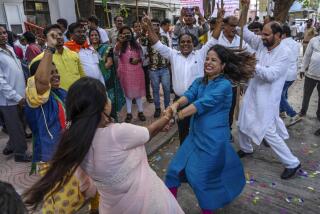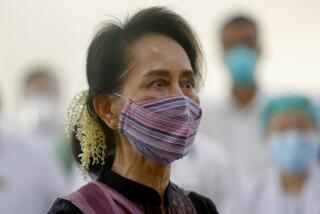Suu Kyi wins seat, early Myanmar results show
- Share via
YANGON, MYANMAR — The people of Myanmar got their first taste of democracy in two decades Sunday, with unofficial results showing they had elected popular opposition leader Aung San Suu Kyi to parliament in the process that ushered in a new era for the long-isolated Southeast Asian nation.
Despite Suu Kyi’s larger-than-life presence in Myanmar, also known as Burma, the apparent victory marks the first time she will hold office; she was under house arrest during general elections in 1990 and the tainted elections of 2010. Crowds erupted in cheers Sunday evening when word of her victory flashed on a giant screen outside her National League for Democracy headquarters.
Supporters, faces covered in party stickers, danced in the streets as passengers on passing buses high-fived pedestrians out the window.
Voting in the by-elections was generally peaceful Sunday amid some allegations of vote tampering and harassment. The pro-military government hopes any shortcomings will be seen as minor enough to convince Western nations it is time to drop crippling economic sanctions.
The National League for Democracy projected late Sunday that it would win as many as 40 of the 43 national and two regional assembly seats up for grabs. Official results were not expected until Monday.
Suu Kyi and her opposition colleagues will have a relatively muted voice in the 664-seat parliament, in which the military and its proxies hold more than 80% of the seats. However, her election still has enormous symbolic importance on the road toward national reconciliation, political analysts said.
“She can change the atmosphere of the parliament, make it more transparent, and engage in actual open debate,” said Maung Wuntha, a political analyst in Yangon. “This is why just one person can change the parliament.”
For many Burmese, the heady feeling of having an electoral voice overcame concerns about sanctions and the limits of reform.
“I voted for Daw Suu!” said Ma Thu, a 33-year-old Yangon resident, using an honorific for the politician while pointing at the fighting peacock electoral symbol representing Suu Kyi’s party. “I’m so pleased that I can vote for her, and I feel proud that I can say that.”
In fact, Ma Thu doesn’t live in Suu Kyi’s constituency and her vote supported HIV/AIDS activist Phyu Phyu Thin, also with Suu Kyi’s party -- a fact she dismissed by saying, “Voting for Phyu Phyu Thin is the same as voting for Aung San Suu Kyi, isn’t it?”
Such ebullient support for Suu Kyi, 66, has heartened her long-banned party but also made it realize the importance of broadening support beyond its standard-bearer, the delicate Nobel Peace Prize laureate, to include younger and diverse voices.
At a news conference Friday, Suu Kyi said rising political awareness among Burmese people after decades of military spoon-feeding was her campaign’s greatest achievement. “We have found that they are quick to wake up and quick to understand what the issues are,” she said.
Analysts and activists welcomed news of Suu Kyi’s apparent victory but cautioned that it was only a first step. Aung Myo Thein, an official with the Thailand-based Assistance Assn. for Political Prisoners fighting for detainee rights, said it remained to be seen how effective she would be in opposing entrenched government policies.
The last relatively fair election in 1990 saw Suu Kyi’s party sweep to victory nationally, shocking generals who then banned the National League for Democracy, jailed many of its members and nullified the results.
Well before Sunday’s elections, candidate Phyu Phyu Thin, representing Yangon’s Mingalartaungnyunt township, said she started to notice significant errors in voter registration lists, including duplicates and the names of dead and underage people, one a 7-year-old.
Even her opponent from the pro-military Union Solidarity and Development Party admitted to irregularities. On Sunday, however, the local election commission denied a problem.
At the eleventh hour, Myanmar invited more than 100 election monitors to observe the balloting, although critics said this was largely a public relations move.
Ma Mee Mee, a coordinator for the ’88 Generation Students opposition group, said in some cases a thin layer of wax on ballots made it difficult to vote for Suu Kyi’s party without having it smudged. There was no tampering, countered election official Kyaw Naing, although he said a few ballots may have had “stains” on them.
--
Special correspondent Paluch reported from Yangon and Times staff writer Magnier from New Delhi.
More to Read
Sign up for Essential California
The most important California stories and recommendations in your inbox every morning.
You may occasionally receive promotional content from the Los Angeles Times.













